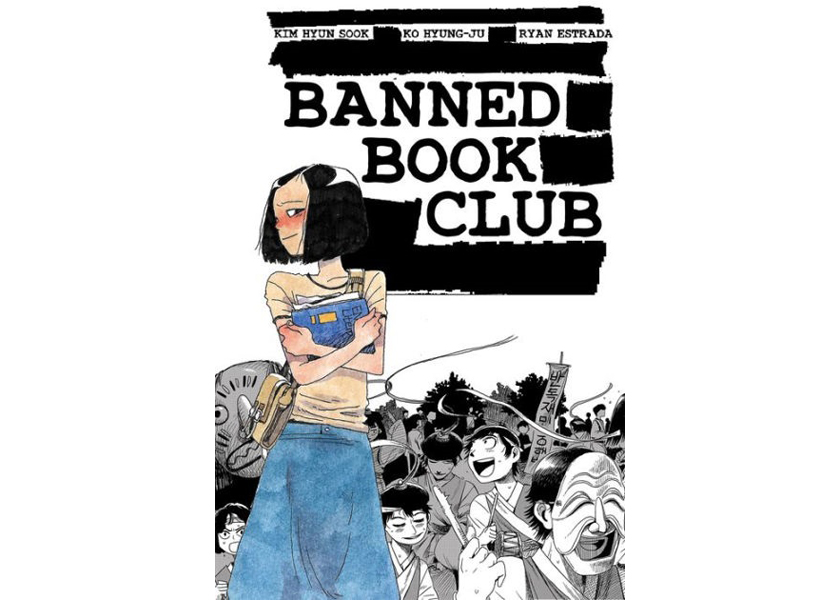Banned Book Club ~ By Hyun Sook Kim and Ryan Estrada
(Iron Circus Comics, Chicago, 2020, ISBN #978-1-945820-42-7)
Review by Joanne Rhim Lee (Winter 2023)

On her first day at university in Seoul, Hyun Sook encounters student activists who invite her to join their protest. As an innocent college freshman, thirsty for knowledge and yearning to find her place, she answers, “I just came her to study, you know? I have nothing to protest about.”
Banned Book Club is Hyun Sook Kim’s gripping graphic memoir, set in 1983 amidst a violent uprising against the military dictatorship of President Doo-hwan Chun. Though Kim changed some names for privacy and safety reasons, the author shares her real experiences and those of her close friends over a period of four years, during a time of her own personal and political awakening.
Hyun Sook’s parents own a restaurant and never attended college. As a new college student, Hyun Sook understands that she needs to put her head down and focus on her education. Her mother is not even supportive of her studies, believing that she would be more useful helping them at the restaurant, but her father encourages her to dream big.
Like most college freshmen, Hyun Sook hopes to make new friends, so when one of her classmates invites her to join a book club, she eagerly agrees. After all, she is a literature major and loves to read classics such as Moby Dick and The Scarlet Letter. However, during her first meeting, she discovers that the club members are reading books by contemporary authors including Noam Chomsky, Che Guevara, and Paulo Freire; she soon realizes they are all banned books.
Hyun Sook’s first instinct is to flee, as she knows that in the current climate, she could be arrested for activities that are even remotely political. She does not want to lose her scholarship, disappoint her parents, or worst of all, go to prison.
Later, in one of her first literature courses, she learns that many of the great writers she admires, including Shakespeare, were actually quite political, and that their stories often commented on contemporaneous events, such as the misdeeds of their kings or other leaders. As a public university employee, her professor knows that she is under certain constraints on what she can tell students. However, the professor challenges Hyun Sook to draw parallels and come to her own conclusions about the current political situation in Korea.
Still curious and wanting to connect with others, Hyun Sook attends a film club, where she views footage of the famous Gwangju incident, which occurred a few years earlier, in May 1980. In high school, she was taught that North Korean spies tried to overthrow the South Korean government in this incident. Her friend Hoon patiently explains that that was not the case. She begins to wonder what really happened.
In South Korea in 1979, a military general Doo-hwan Chun, a close aide of the president, seized power through a coup after President Chung-hee Park, was assassinated. Park, another military dictator, had ruled since 1962, and had declared himself to be South Korea’s president for life.
Students and other activists rose up to protest the new President Chun’s illegal takeover of power, but their actions were quickly put down by Chun’s military force, which killed over 600 protesters. To distract the public and the international community from what he was doing, Chun claimed that he was protecting his people from a North Korean Communist invasion. However, there was never any invasion.
In the story, Hyun Sook’s friend Hoon explains that with constant repression and violence, Chun was successful in breaking protesters’ spirits. “They just got so beaten down by all of it for so long, they got tired of talking about it. It became normal. That’s why we protest. That’s why we read books we’re not supposed to.”
As Hyun Sook’s eyes are opened to the world outside of her sheltered family life, she sees that perhaps there is more she wants to do than just read books. At the same time, as she becomes more invested in her new friends’ lives, she sees firsthand that there are often very real consequences to speaking out against injustice.
Illustrator Hyung-Ju Ko’s stark black-and-white illustrations perfectly capture the fear in Hyun Sook’s eyes and the danger of the larger political situation, but also the kindness and humanity in her classmates’ faces and actions. With growing courage, Hyun Sook achieves her goal of making friends, and also finds her voice along the way.
Banned Book Club could have been merely a 1980s history lesson, but Kim bookends her story with a class reunion in 2016, when the reader learns what happened to all the activist members of the original book club. In 2016, some of them are still demonstrating on the streets to force another President Park to step down; this time it is President Chung-hee Park’s daughter Geun-hye Park, who was South Korea’s president from 2013 to 2017.
Kim’s story is a reminder of Martin Luther King Jr.’s famous quote that “the arc of the moral universe is long, but it bends toward justice.” When (the second) President Park was impeached, then found guilty of corruption and imprisoned, a few brave individuals, including in her own administration, stood up for justice.
Leading up to Park’s ouster, an estimated 16 million people nationwide peacefully demonstrated for 20 successive Saturday nights in South Korea’s cities, standing outdoors with candles. This Candlelight Revolution sustained the determination and solidarity of South Koreans that Park must be removed from office and prosecuted.
Since this dark period of South Korean history, things continue to improve and the arc is bending. Kim’s memories of coming of age during a confusing time are a good reminder for all of us to stand up and speak out against injustice, even though we might prefer to put our heads down and walk past it.


